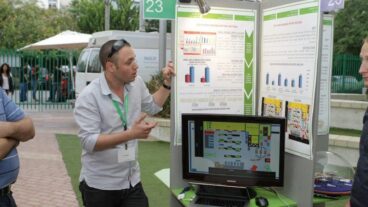The economic benefit of NoriTech’s system is its ability to produce a pre-planned, standardized crop, guaranteed to be enriched with nutritional elements.Over the last decade, sushi has boomed in popularity around the world. While most people focus on the delectable fish wedged between the rice, Israeli scientists are taking a more in-depth look at the seaweed wrapping which holds the rice and seafood together.
The glossy purplish-black edible seaweed sheets are made up of Porphyra, or more commonly known as Nori. Health food experts the world over recognize that Nori’s nutritional value is vast; especially because of its high vitamin A and protein count.
While Nori farming in Asia has been around for centuries, pollution and weather irregularities consistently threaten the industry.
Israeli startup NoriTech Seaweed Biotechnologies Ltd has developed a method of growing Nori algae that doesn’t depend on outside elements, and that will ensure a high level of nutrients. They have begun cultivating Nori using on-land seawater ponds, which enables the crop to grow out of its natural habitat, in a stable, fully controlled and environmentally friendly cultivation system.
“Until today, the Nori has been cultivated in the open sea near Japan, China and Korea. You never knew what quantity or quality the Nori would yield. It all depended on the sea,” said Alex Harel, CEO of NoriTech. “We came up with a way to grow Nori sheets that will guarantee a high amount of its nutritional elements.”
And while many people recognize Nori only when it is surrounding rice and fish, NoriTech is also pioneering ways to cultivate the crop for use in other food industries, as well as the nutraceutical, cosmetics, and pharmaceutical industries.
“We are the only ones in the world who succeeded in this technology,” notes Harel, who has been with the Yokneam-based company since 2003, told ISRAEL21c.
The economic benefit of NoriTech’s system is its ability to produce a pre-planned, standardized crop, guaranteed to be enriched with nutritional elements. According to the company’s profile, NoriTech’s biotechnology makes it possible to enrich the Nori it grows with added proteins, fibers, and certain minerals.
NoriTech’s algae could be grown to be compatible with the standards and needs of the nutraceutical and functional foods markets.
“The global nutraceutical and functional foods industries are growing steadily. We hope to provide high-end Nori products to these emerging markets,” said Harel, who has a background in selling medical devices.
According to NoriTech’s web site, the global market for all types of nutritional products in 2000 was $140 billion. Of that amount, just over $102 billion was due to sales of vitamins, minerals, herbs, functional foods, sport nutrition, meal replacements and specialty formulas. The fastest growing segment is that of functional foods. There was also a 17 percent growth in the demand for marine oils.
In addition to wrapping sushi, Nori is used in cooking (salads, soups, bread); medicines (burn therapy, inhibits growth of certain tumors, assists to neutralize cataracts); and well-being tablets (contains vitamins C, A, B, amino acid arginine, zinc, taurine, alanine, glutamic acid and glycine).
To break into the global markets, NoriTech is collaborating with Oceans Nutrition Canada of Halifax, Canada.
“We came out with the technology, ONC will locate uses for our Nori in nutraceutical and functional foods products,” said Harel, noting that the two companies made their match through a joint project three years ago organized by the Canada-Israel Industrial Research and Development Foundation.
NoriTech was founded by Dr. Israel Levy, the company’s chief technological officer, and was incorporated in January 2000 under the framework of Israel Chief Scientist’s Technological Incubators program.
“Seaweed and marine agriculture is very developed in Israel. The Israeli Oceanographic and Limnological Research Institute performed wide and varied research on algae over the years. One of the projects was on Nori and it is from here Yisrael Levy came up with NoriTech’s revolutionary technology,” said Harel.
Today, there are just three people on staff, but Harel said within a year – when the company graduates from its incubator status and moves out of its operation within the Naiot Technological Center – its personnel will grow to 10 or 15 people.
Naiot is a pre-seed technology incubator that focuses on investments in early-stage Israeli medical device and high-tech companies. Since its formation in 1996, the corporation, which is a subsidiary of Ofer Brothers Group, has succeeded in securing more than US$150 million for its portfolio companies. Naiot earned the Israeli Chief Scientist “Best Incubator Award” three times.
At the moment, NoriTech has a pilot production plant in Haifa. During a four-month trial run season, the company produced hundreds of kilograms of enriched Nori. Harel says NoriTech is now looking to expand even further into North America. “We need cold water for our technology,” he said. “We’re in the process of establishing growing facilities in Canada and the US.”
NoriTech prefers not to sell its technology but rather “have subsidiaries” abroad.
Additional Nori growing farms would fulfill what Harel says is Noritech’s aim, being “the worldwide leader in providing proprietary Nori-derived products to the emerging nutraceutical and functional foods markets” across the globe.












